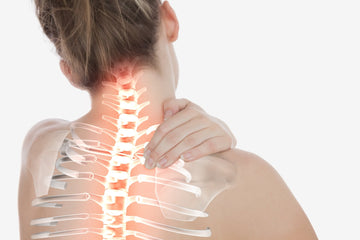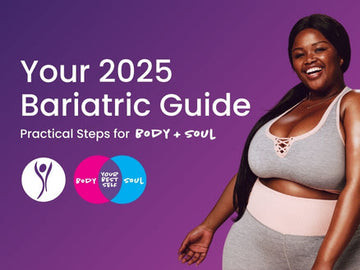Exploring the Impact of Weight Loss on Bone Density
by Brenda Hoehn on May 16, 2024

Exploring the Impact of Weight Loss on Bone Density

Embarking on the weight loss journey through bariatric surgery is a transformative decision. It's a step towards a healthier, more fulfilling life. However, amidst the excitement of shedding pounds, it's essential to emphasize a fundamental aspect: bone health.
In this blog, we'll delve into the relationship between weight loss and bone density, explain the mechanisms of post-bariatric bone loss, discuss the risks and complications, and provide strategies for preserving bone density. Let's get started on this journey to support your skeletal wellness.
Understanding Bone Density
Before we discuss the specifics, let's define bone density (i.e., bone mineral density). Simply put, bone density refers to the amount of calcium and other minerals comprising your body’s bone tissue. Bone density is vital for overall skeletal health. The higher your bone density, the stronger your bones are. However, the inverse—lower bone density equaling weaker bones—is also true.
Bone Resorption vs. Formation
Our bodies regulate bone density with resorption and formation. Resorption refers to the body’s process of breaking down and removing old bone tissue, while formation is the creation of new bone tissue. A delicate balance between these two processes is necessary for maintaining optimal bone health. The risk of bone density complications increases when the body breaks down more bone than it can replace.
Adipose Tissue and Bone Health
Now, let's talk about the role of adipose tissue (i.e., fatty tissue) in maintaining skeletal and bone marrow health. Fatty tissue serves various bodily purposes, like storing excess energy from foods. However, fat is also an active endocrine organ that creates and secretes hormones that impact the whole body’s metabolism, encompassing bone metabolism and maintenance.
How Bariatric Surgery Impacts Bone Density
While bariatric surgery offers remarkable benefits in weight loss and overall health improvement, it's not without its side effects. One significant concern is the potential impact on bone health. Studies have shown that bariatric surgery can promote accelerated bone loss, particularly in malabsorptive and mixed procedures, including:
- Mini-gastric bypass
- Sleeve gastrectomy
- Roux en Y gastric bypass (RYGB)
- stomach intestinal pylorus-sparing (SIPS)
- Biliopancreatic diversion with duodenal switch (BPD DS)
Mechanisms of Post-Bariatric Bone Loss
So, why does bone density loss occur after bariatric surgery? There are several influencing factors:
- Nutrient malabsorption
- Mechanical unloading*
- Changes in cell function between adipose tissue, bone, and muscle
These mechanisms can disrupt the delicate balance of bone resorption and formation.
Bone Loss Risks and Complications
Bone loss isn't a concern to downplay. It can have profound implications, especially for specific demographics. Due to decreased bone density, women in early to late middle age are particularly vulnerable to osteoporosis and fragility fractures. These fractures can significantly impact quality of life and independence, underscoring the urgency of proactive bone health management.
Strategies for Preserving Bone Density
Fortunately, there are steps you can take to preserve bone density and mitigate the risks associated with bariatric surgery. Incorporating progressive resistance training into your exercise routine, ensuring adequate vitamin D, calcium, and protein intake, and participating in rehabilitative programs, such as physical therapy, can all help support bone health.
Calcium, Vitamin D, and Protein Consumption
When it comes to bone health, calcium and vitamin D go hand-in-hand. Our bodies need calcium to create new, dense bone tissue. Daily nutrition (i.e., foods and drinks) is the only way to fulfill our calcium requirements. Vitamin D helps the body absorb the calcium from our diets while promoting healthy muscle function and providing immune support. But wait—don’t forget about protein!
Protein is essential to a post-bariatric nutritional plan—supporting wound healing, weight loss, satiety, and more. Research shows that the rate of bone density loss in diets where protein intake does not meet an individual’s bodily needs is higher than in diets deficient in calcium and vitamin D.
Calcium and Vitamin D Dietary Supplements
Safe, effective calcium and vitamin D supplements are game changers for bariatric patients. At ProCare Health, we offer a generous range of dietary calcium supplements, including our proprietary Calcium Soft Chews complete with (per serving):
- 500 mg calcium
- 500 IU vitamin D3
- 500 million CFUs probiotics
We also carry products like elemental calcium citrate and 500 mg vitamin D3, plus therapeutics such as vitamin D3 and cal-mag DK.
Protein Dietary Supplements
We cannot stress enough the importance of protein in post-bariatric surgery life. ProCare’s daily protein supplements include powders, like our Whey Isolate Protein Powder (chocolate and vanilla. But that’s not all! We change the game with liquid and food options with varying flavors of LiquaCel, concentrated liquid protein drinks, and high-protein OSTRIM snack sticks.
Bone Health Considerations in Bariatric Surgery
Bone health considerations are crucial when planning bariatric surgery. Different bariatric procedures may have varying effects on bone density and overall bone health, making it essential for bariatric healthcare teams to meticulously evaluate and determine the ideal treatment plan specific to each patient.
While bariatric surgery offers immense benefits in weight loss and overall health improvement, it's vital to protect bone health along the journey. Understanding the relationship between bone density and bariatric surgery and taking proactive steps to support skeletal wellness can ensure a brighter, healthier future.
Boost Bone Density with ProCare Bariatric Supplements
Embarking on a weight loss journey with bariatric surgery can lead you to long-term success. ProCare Health is your committed guide, offering specialized bariatric supplements, educational resources, and community support. With our exceptional once-daily multivitamins and expert insights from Brenda Hoehn, MSN, BSN, RN, CHTP, we provide the solutions you need for optimal health and wellness.
To learn more about ProCare Health, please visit https://procarenow.com/.









